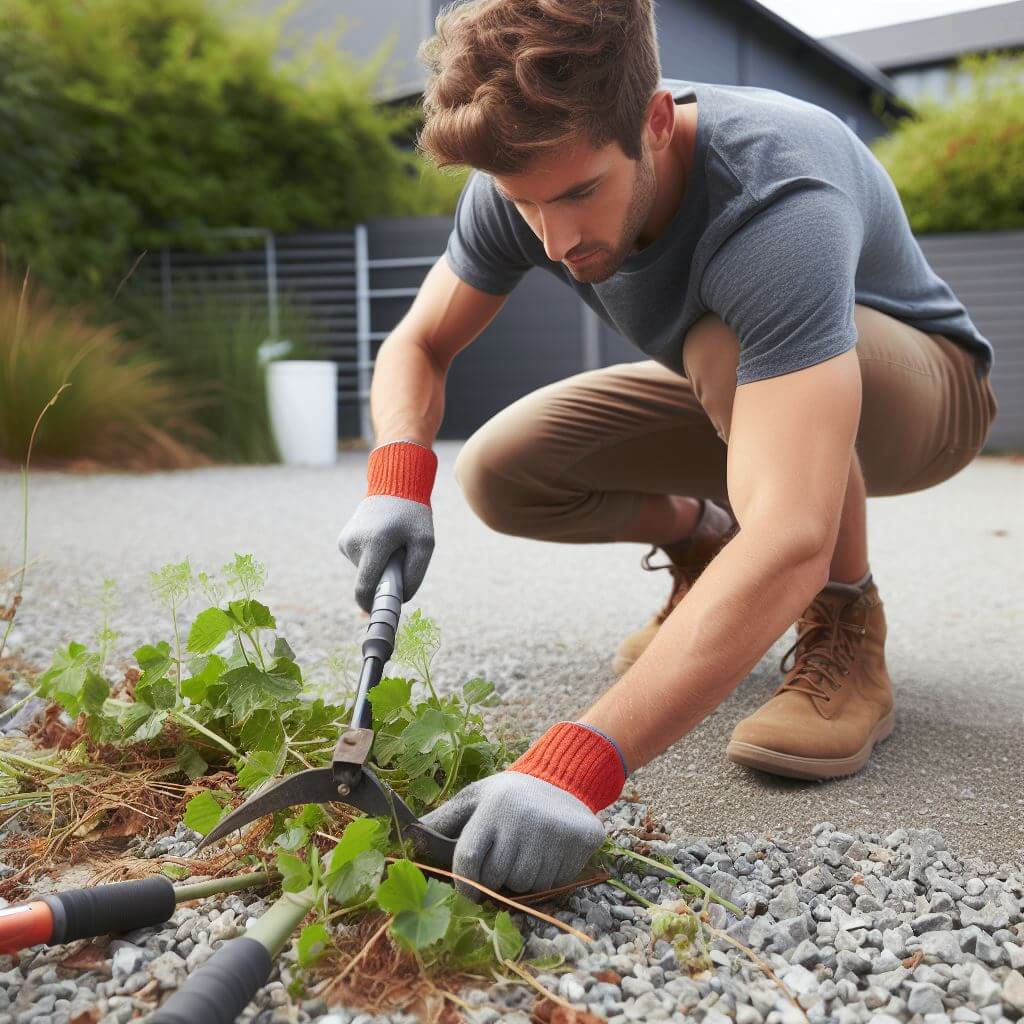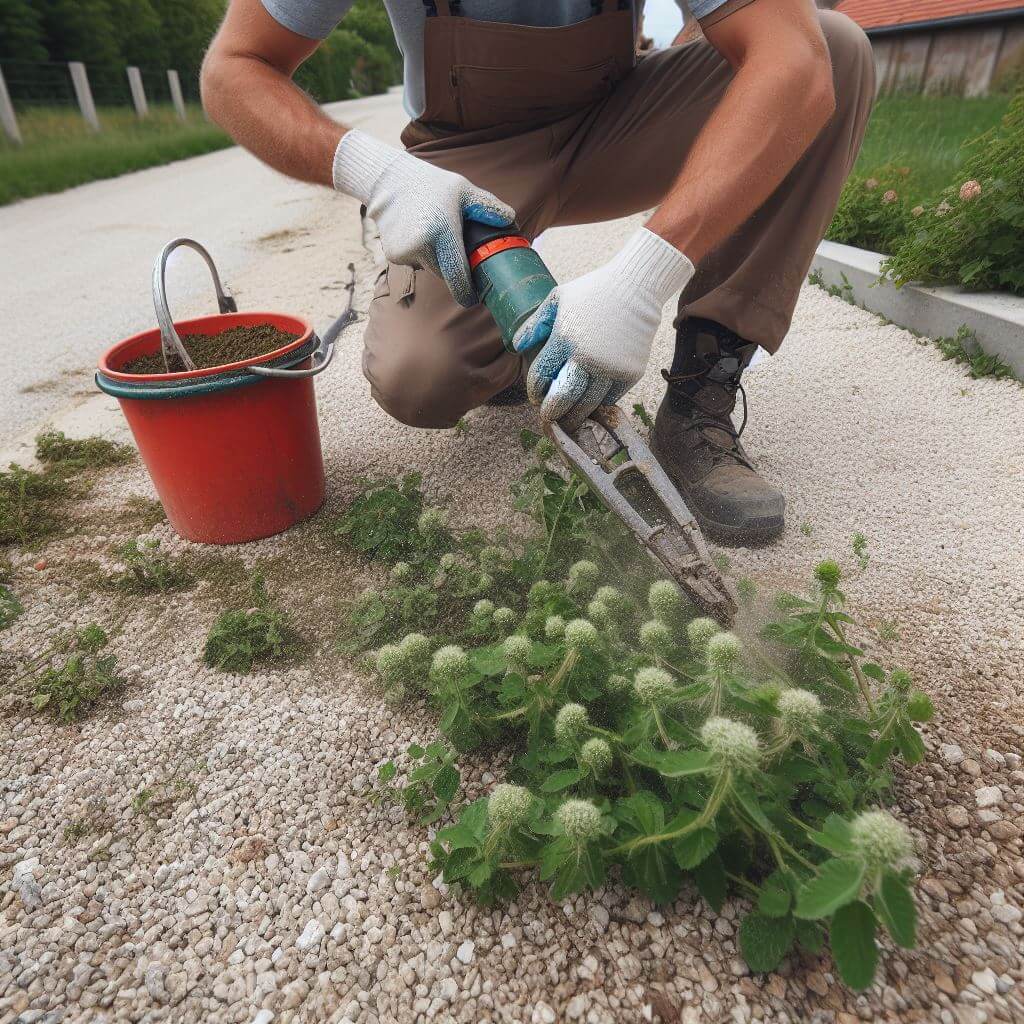- Home
- Organic Weed Killer
- How to Permanently Get Rid of Weeds in Gravel Driveways
How to Permanently Get Rid of Weeds in Gravel Driveways: The Ultimate Guide
Weeds are the bane of any homeowner's existence, especially when they invade the serene aesthetics of a well-laid gravel driveway. Not only do they detract from your property's curb appeal, but they also compromise the integrity of your driveway's structure over time.
The battle against these unwelcome guests is ongoing, but with the right strategy, you can claim a lasting victory. In this comprehensive guide, we'll walk you through the best practices, tips, and techniques to permanently get rid of weeds in your gravel driveway.
Understanding Weeds in Gravel Driveways

Before diving into the weed annihilation techniques, it's important to know your enemy. Weeds that sprout in a gravel driveway are not a random occurrence; they're the result of opportunistic seeds finding a hospitable place to germinate. Weeds most commonly found here are either perennial—which regrow every year from their root system—or annual—which sprout from seeds each year. Examples include dandelions, crabgrass, and chickweed.
Types of Weeds Commonly Found in Gravel Driveways
In a gravel driveway, the type of weed you encounter could provide clues as to how they should be dealt with. Some weeds, like dandelions, have deep taproots making them tougher to eradicate, while others, such as crabgrass, have shallower root systems that are easier to remove.
Reasons Why Weeds Thrive in Gravel
Several factors contribute to weed success in gravel driveways:
- Seed dispersal: Weeds are adept at spreading their seeds, which can find their way into even the smallest cracks and crevices.
- Drainage: Gravel driveways typically have excellent drainage, providing moist conditions beneath the surface where weeds can thrive.
- Neglected maintenance: Over time, gravel driveways can accumulate organic matter between stones, creating a fertile ground for weeds.
The Impact of Weeds on Driveway Integrity
The emergence of weeds might initially seem like a minor nuisance, but they can cause significant damage over time. As weeds grow, they displace the gravel and create space for more dirt and seeds to collect. This cycle, left unchecked, can lead to a breakdown of the driveway's base and costly repairs.
Weeds are not just an aesthetic issue—they're a threat to your driveway's durability. With this understanding, we can better appreciate why investing time in their removal is not just for looks—it's essential maintenance.
In the next section of this guide, we'll explore the pre-emptive measures you can take to reduce weeds' chances of taking root in the first place.
Preventative Measures to Discourage Weed Growth

Preventing weeds from germinating is the first line of defense in maintaining a pristine gravel driveway. Here's how you can set up barriers and conditions that discourage weed growth right from the start.
Choosing the Right Gravel
The type of gravel you choose plays a significant role in weed prevention. Larger stones offer less opportunity for weeds to sprout between the gaps, while smaller pebbles can make it easier for weeds to get a foothold. Opting for sharp-edged gravel can also be a deterrent, as it creates an inhospitable environment for weed seeds to settle.
Underlying Barriers for Weed Control
Landscape fabric and geotextiles are excellent tools for weed suppression. These barriers are laid under the gravel to prevent weeds from growing up from the soil below. If you're looking for a DIY solution, several layers of newspaper or cardboard can be a temporary alternative, although they will eventually decompose and are not as effective in the long term.
Proper Gravel Driveway Installation
Proper installation is paramount. Ensure your driveway has a good grading—a slight slope to redirect water away from the driveway and prevent pooling. Layering is also critical; start with a base layer of larger rocks, add a middle layer of smaller stones, and finish with your gravel top layer. This structure discourages weed growth and ensures good drainage.
By implementing these preventative measures, you're not just discouraging weeds, you're setting up your driveway for long-term durability and ease of maintenance.
Next, we'll cover the regular upkeep practices you can adopt to keep weeds at bay.
Regular Maintenance Practices
Routine maintenance is essential to keep your gravel driveway weed-free. Stay vigilant with these practices to prevent small problems from becoming big ones.
Importance of Driveway Maintenance for Weed Control
Regularly inspecting your driveway and taking immediate action at the first sign of weeds can save you a lot of time and effort. A well-maintained driveway is less prone to the conditions that allow weeds to flourish.
Inspection and Immediate Removal of New Weeds
Set a schedule to walk your driveway and inspect for new weed growth. If you spot them, remove them immediately, making sure to get as much of the root as possible. Hand tools like a weed puller or hoe can make this job easier.
Raking and Topping Up Gravel
Regular raking helps to disrupt the early stages of weed growth and maintain an even surface. Over time, gravel may become compacted or thin in areas; topping it up can refresh the structure and prevent weeds from finding a place to root.
The Effectiveness of Salt and Boiling Water Treatments (Natural Remedies)

For a natural approach to killing off weeds, you can use common household items:
- Salt: Spread sparingly where weeds are growing; salt dehydrates plants and prevents them from absorbing moisture.
- Boiling Water: Pour directly onto the weeds; the heat will kill them and can be a quick fix for small areas.
Remember, both of these methods can affect the surrounding soil and should be used judiciously to avoid damaging the environment for other plants or animals.
Maintaining your gravel driveway is an ongoing commitment, but with consistent care, keeping it weed-free requires less time and effort than you might think. Up next, we'll explore both natural and chemical solutions for dealing with existing weeds.
Natural and Chemical Solutions for Existing Weeds
When preventative and maintenance measures aren't enough to keep aggressive weeds at bay, it's time to consider more direct eradication solutions. Whether you prefer natural remedies or chemical herbicides, there are effective ways to tackle persistent weeds in your gravel driveway.
Creating a Vinegar-Based Weed Killer
Vinegar is a popular choice for those seeking a natural herbicide. Its acetic acid content effectively burns weed foliage upon contact, though it may not always kill the root system. To create a stronger solution, you can mix:
- 1 gallon of white vinegar
- 1 cup of salt
- A tablespoon of liquid dish soap
Be careful when applying this mixture; it can affect other plants and alter the soil pH.
Commercial Herbicide Options
For tougher weed infestations, a chemical herbicide might be the most effective solution. When selecting a commercial product, look for key active ingredients known to target the weeds in your driveway. Always follow the instructions closely, and wear protective clothing to ensure your safety during application.
Pros and Cons of Natural vs. Chemical Treatments
| Natural Remedies | Chemical Herbicides |
|---|---|
| + Environmentally friendly | + Potentially more effective |
| + Safe for pets and children | + Faster results |
| + Inexpensive | - Can be harmful to the ecosystem |
| - May require repeated application | - Requires careful handling |
| - May not kill root systems | - Can be more expensive |
It's crucial to weigh these aspects and choose the method that aligns with your values and the specific needs of your gravel driveway.
The direct methods outlined here can be effective when applied correctly, but they're more of a reaction to an existing problem. Ideally, you should couple these solutions with the preventative measures discussed previously for a comprehensive weed management strategy.
In the following section, we delve into a detailed, step-by-step approach to remove weeds from your gravel driveway effectively.
The Step-by-Step Process of Removing Weeds from Gravel Driveways
To successfully remove weeds from a gravel driveway, a systematic approach is required. This section provides a step-by-step guide on how you can rid your driveway of weeds and keep it looking its best.
Manual Weed Removal Techniques
Manual removal is often the first step in weed control. Although it can be labor-intensive, it's an effective way to tackle weeds without the use of chemicals.
1. Tools Needed:
- A good pair of gardening gloves
- A weed puller or a hand weeder
- A hoe or a garden trowel
- A wheelbarrow or bucket for weed disposal
2. Best Practices:
- Always try to remove the entire root to prevent regrowth.
- Use the tools to loosen the soil around the weed to make removal easier.
- Dispose of weeds properly to prevent seed dispersal.
Applying Natural Solutions
If manual removal isn't enough or practical for your situation, consider using natural solutions.
- Preparing Your Natural Weed Killer: Combine your vinegar, salt, and dish soap in a spray bottle or garden sprayer.
- Application Method: Spray the mixture directly onto the weeds, ideally on a sunny day when rain isn't forecasted. Target the weed's foliage and avoid spraying the surrounding gravel to minimize soil damage.
Using Chemical Herbicides Safely
Chemical herbicides can offer a more powerful solution for weed removal, particularly if you're dealing with a large area.
Safety Precautions:
- Wear protective clothing, such as gloves, a mask, and goggles.
- Read and follow the product's instructions carefully.
Application Method:
- Apply the herbicide directly to the weeds, taking care not to overspray onto other areas.
- Consider a targeted spray nozzle to minimize drift.
Post-removal Clean-up and Maintenance Tips
After you've removed the weeds, either manually or with a solution, it's important to follow up with proper clean-up and maintenance.
- Remove any dead weeds and dispose of them securely.
- Rake the gravel to ensure an even surface and disrupt any new weed growth.
- Consider applying a fresh layer of gravel if necessary to bolster your driveway's defense against weeds.
By following these steps, you can effectively manage and remove weeds from your gravel driveway, restoring its aesthetic appeal and functionality. It's important to remember that this process may need to be repeated periodically, as new weed seeds can always find their way into your driveway.
Next, we'll examine some advanced techniques for those particularly stubborn weed problems that regular measures can't solve.
Advanced Weed Removal Techniques
Sometimes, despite our best efforts, weeds prove to be particularly tenacious. In these cases, more advanced removal techniques might give you the upper hand. Here's a closer look at some of the options available.
Flame Weeding: Is It Right for Your Driveway?
Flame weeding uses intense heat to kill weeds down to the root. It's a powerful method, but it comes with safety concerns and should be used with caution.
Pros:
- Effective at killing weeds completely.
- Chemical-free method.
Cons:
- Risk of fire, especially in dry conditions.
- Not suitable for use near flammable materials or in windy weather.
Power-washing for Weed Control
Power-washing can remove weeds and the debris that encourages their growth. This high-pressure cleaning method can also refresh the appearance of your gravel driveway.
Pros:
- Removes not just the weeds but also moss, algae, and dirt.
- Can help prevent future weed growth by cleaning out cracks and crevices.
Cons:
- Can potentially displace the gravel if not done carefully.
- May require occasional re-leveling of gravel after washing.
Both of these methods are best suited to specific situations and should be selected based on the nature of your weed problem and the layout of your driveway.
When dealing with tougher weed problems, advanced techniques like flame weeding and power washing can be effective when used appropriately. These methods, coupled with diligent preventative maintenance, can provide a longer-term solution to weed invasions.
Let's move forward into long-term strategies for maintaining a weed-free gravel driveway and ensuring your efforts have lasting effects.
Long-term Strategies for a Weed-Free Driveway
In order to keep your gravel driveway permanently free of weeds, it's essential to have a long-term strategy in place. Below are some key approaches that, when used in conjunction, can provide enduring results.
Landscape Design Considerations
Evaluating your surroundings and incorporating strategic landscaping designs can help suppress weed growth.
- Plant Choices: Select ground-cover plants that can outcompete weeds for space and resources.
- Ground Cover Options: Consider adding a layer of mulch around plants to further inhibit weed germination.
Regular Resurfacing to Deter Weed Growth
Over time, the upper layer of your gravel driveway may become compacted or mixed with soil, making it a haven for weeds. Resurfacing with a fresh gravel layer every few years can restore the driveway's inhospitable environment for weeds.
Strategic Use of Edging to Minimize Weed Encroachment
Using edging materials such as plastic, metal, or stone along the sides of your driveway can create a physical barrier that prevents weeds from creeping in.
- Installation: Edging should be buried deep enough to block the roots and high enough to prevent seed spread.
- Maintenance: Check and maintain the integrity of the edging regularly as part of your driveway upkeep.
By combining these long-term strategies, along with the preventative and immediate measures outlined previously, you can enjoy a clean, attractive, and weed-free gravel driveway for years to come.
In the next part, we will address some common questions and offer troubleshooting tips to help you manage any unexpected challenges in maintaining your gravel driveway.
Common Questions and Troubleshooting
When undertaking weed control in your gravel driveway, you may encounter challenges along the way. Here’s a compilation of frequently asked questions and their solutions to help you troubleshoot common scenarios.
FAQ About Weed Removal and Driveway Maintenance
How often should I check my gravel driveway for weeds?
Regular inspection every two weeks is recommended, though this may vary depending on the seasons and your local climate.
Can I use a pre-emergent herbicide on my gravel driveway?
Yes, pre-emergent herbicides can prevent weed seeds from germinating. However, these should be used cautiously, following manufacturer instructions, and considering environmental impact.
What should I do if I accidentally over-apply salt or vinegar?
Flush the area thoroughly with water to dilute the concentration and minimize soil damage.
Solutions to Common Problems Encountered During Weed Removal
Problem: Weeds keep returning even after treatment. Solution: Ensure that you're removing the entire root system when manually weeding and consider combining methods like a natural weed killer followed by mulching or resurfacing with new gravel.
Problem: Manual weeding is too labor-intensive for my large driveway. Solution: Consider machine-assisted techniques like a flame weeder or investing in a professional service if the area is extensive.
Problem: Herbs and plants near my gravel driveway are getting damaged. Solution: Be more precise when applying herbicides or natural solutions. Use protective barriers or shields to keep desirable plants safe when treating the vicinity.
By applying this advice and adapting your approach as needed, you should be able to effectively manage the weeds in your gravel driveway and keep it looking its best.
To conclude, let's recap the important points covered in this comprehensive guide.
Conclusion
Achieving and maintaining a weed-free gravel driveway requires a multifaceted approach that combines vigilance, preventative measures, and effective treatment options. By understanding the types of weeds that can invade your driveway, employing regular maintenance practices, and using both natural and chemical solutions judiciously, you can preserve the aesthetic and structural integrity of your driveway.
We've covered ways to create inhospitable conditions for weeds, from choosing the right gravel size to installing solid edging and barriers. We've explored the importance of a regular maintenance routine, including effective cleanup and resurfacing strategies. And we've discussed advanced techniques for stubborn weed issues, ensuring you're equipped for any scenario.
Remember, consistency is key. With persistent efforts and smart strategies, your gravel driveway can remain a clean, welcoming entrance to your home. Weed control is not just a one-time task, but an ongoing commitment to the beauty and functionality of your property.
Thank you for following along with this guide. We hope it serves as a valuable resource in your quest for a flawless, weed-free driveway.
FAQ: How to Permanently Get Rid of Weeds in Gravel Driveways
1. How do weeds grow in gravel driveways?
Weeds in gravel driveways can grow from weed seeds carried by wind, animals, or shoes. They can also emerge from existing weeds that are not fully removed.
2. What are the best methods to remove weeds from gravel driveways?
Vinegar and boiling water are effective natural solutions to kill weeds in gravel driveways without using chemicals. Additionally, using rock salt can also help prevent weeds from growing back.
3. How can I permanently get rid of weeds in my gravel driveway?
To permanently get rid of weeds in your gravel driveway, consider using landscape fabric to prevent weed seeds from germinating and growing. This will help in keeping the gravel area weed-free for a longer period of time.
4. What is the most effective way to kill weeds in gravel driveways?
The most effective way to kill weeds in gravel driveways is by using a weed killer specifically designed for gravel surfaces. Avoid using chemicals that may harm the gravel and surrounding vegetation.
5. How to prevent weeds from growing in gravel driveways?
Sprinkling rock salt or using a natural weed killer can help prevent weeds from growing in your gravel driveway. Regular maintenance and removal of newly emerged weeds can also prevent them from spreading.
6. Can I use chemicals to get rid of weeds in my gravel driveway?
While using chemicals is an option, it is important to use them cautiously to avoid harming the surrounding environment. Consider using environmentally friendly weed killers that are safe for gravel driveways.